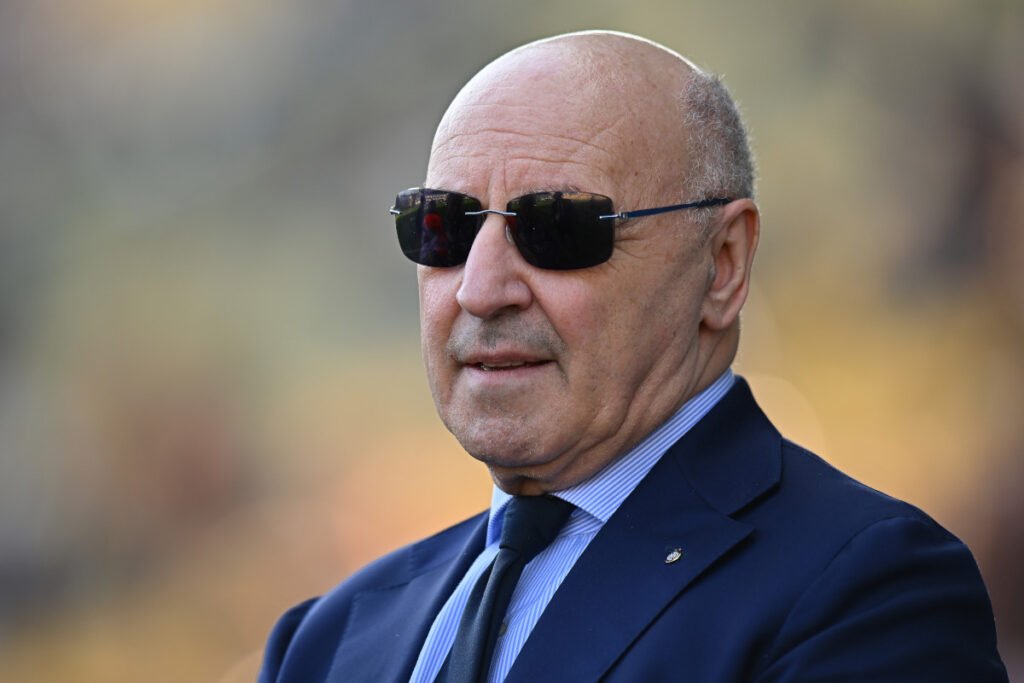The advanced plans to stage a La Liga match between Villarreal and Barcelona in Miami in December spectacularly and suddenly crumbled on Tuesday.
Villarreal executives learned the game would no longer take place in the middle of their 2-0 home Champions League defeat by Manchester City, while Barcelona were shocked out of their celebrations having just beaten Olympiacos 6-1.
As the news broke, first reported by The Athletic’s Adam Crafton, there were scenes of great confusion as Barca’s players picked up the story on their mobile phones. Some of them had already started making plans to stay out in the United States on holiday after the Villarreal game, which was set for December 20 at Hard Rock Stadium. Now, it was all finished in a flash.
How did all this happen? It’s a story that takes in various factors, including, most significantly:
- Last weekend’s dramatic protests across Spanish football’s top flight, where players collectively stopped on the pitch for 15 seconds after kick-off
- The strong opposition and legal maneuvering of Real Madrid, Barcelona’s bitter rivals, and their rancorous relationship with La Liga’s leadership
Allow us to explain the full picture — and what we can expect to happen next. We’d also welcome readers sharing their views on the situation using the form within this article.
Why did La Liga decide to cancel the Miami game?
On Tuesday, La Liga released a statement saying that following conversations with the promoter of the proposed Villarreal vs Barcelona game in Miami, “the decision has been made to cancel” due to the “uncertainty that has arisen in Spain over the past few weeks”.
The promoter in question is Relevent Sports, the company co-founded and owned by billionaire Miami Dolphins owner Stephen Ross. Relevent have a joint venture with La Liga to grow the league’s business in North America, and the game between Barcelona and Villarreal was due to be played at the Dolphins’ Hard Rock Stadium.
Relevent have quietly become a major player in global soccer, not only as a match promoter, but also developing a leading media rights business in which they sell broadcast deals on behalf of UEFA club competitions, La Liga, the EFL, Bundesliga and Serie A. As such, their reputation is significant.

Girona’s players pausing on the ball during their game at Barca on Saturday (Jose Breton/Pics Action/NurPhoto via Getty Images)
A Relevent statement also cited “uncertainty in Spain” when saying it would be “irresponsible” to begin selling tickets. It said they informed La Liga they felt there was insufficient time between now and December 20 to properly and professionally execute an event of this magnitude.
The final decision was made by La Liga, and it did, in some ways, come as a surprise given how relentlessly both La Liga and Relevent have pushed for a domestic game in the U.S. in recent years, both through the courts and in the media. The parties believed they had the requisite regulatory and legal approvals following victories in a series of lawsuits, but La Liga still needed to manage diplomatic challenges within Spain, where there was opposition from the players’ union, Real Madrid, supporters’ groups, and some politicians.
The Spanish football supporters’ association, FASFE, linked up with Villarreal and Barca fan groups to state their “absolute, total and firm opposition” to the plans.
Over the past weekend, La Liga sides did not start play for the opening 15 seconds of matches after the Spanish Footballers’ Association (AFE) said on Friday that the players were unhappy with the Miami plan.
Real Madrid, arguably the most powerful individual team in the Spanish top flight, also asked FIFA to block the game from going ahead, arguing it would undermine the “integrity” of La Liga. The Athletic reported on their opposition back in April, with Madrid executives believing the elimination of home advantage for a team in a single game could have a material impact on the outcome of eventual league positions.
All of these factors appear to have conspired against La Liga’s ambitions, breeding sufficient uncertainty and ultimately leading to a change of plans.
Adam Crafton
Why was there such negative reaction in Spain? And where do Real Madrid come in?
The reaction to the idea of playing in Miami, and how it was organised, was more mixed than entirely negative, and broke down along already existing faultlines within Spanish football.
Most Spanish clubs — their presidents, directors and executives at least — have been generally in favour of the idea in recent years. And both Barcelona and Villarreal were firmly behind playing in the U.S. this December.
Many domestic supporters were against it, but the club hierarchies involved were willing to go against those wishes. Javier Tebas is used to fans protesting against his La Liga presidency, and often gives the impression that international expansion and new markets are more important than catering to the views of existing local supporters.
But last week’s player protests, organised by the AFE, was another factor in how it all unravelled, and there was genuine anger among the squads.
Some of the Barca and Villarreal players due to play in the game also felt the idea had been rammed through without taking their views into account. There is general unhappiness about the match calendar among many top players, and this involved more travel and hassle (without any benefits for those actually playing the game).

La Liga president Javier Tebas (Arnold Jerocki/Getty Images)
La Liga’s team captains, meanwhile, were unhappy with Tebas not being able to find time in his schedule to meet them and discuss the project. Nor were they pleased with the league’s requests for broadcasters not to show their protests on TV last weekend.
However, the biggest factor was the opposition of Real Madrid, and how the Miami game became caught up in the bitter battle for power and influence between Madrid president Florentino Perez and La Liga’s Tebas.
Perez’s uneasy and complex relationship with his Barcelona counterpart, Joan Laporta, was also hurt recently by Barca moving closer to UEFA and away from the long-stalled Super League project so strongly backed by Real Madrid. “If Madrid lined up with Barcelona on this project, nobody would be able to stop it,” said one industry source, speaking anonymously to protect their position, like others consulted for this article.
Multiple sources told The Athletic that Madrid’s two official complaints to the Spanish government’s Higher Sports Council (Consejo Superior de Deportes, CSD), which alleged that La Liga did not have the right to take a domestic game overseas, and raised the possibility of Tebas even being suspended from his position, was the most important factor in the ultimate decision to cancel the game in Miami.
On Wednesday, CSD president Jose Manuel Rodriguez Uribes said Tuesday’s events showed “this was not the way to do things”.
In a statement, he added: “Before taking an initiative of this nature — a decision so important that it could undoubtedly have affected the integrity of the competition — there needed to be dialogue and agreement among the participants, among all the clubs.
“In the future, if there are any ideas along these lines, we must start from this need for dialogue, agreement and absolute transparency.”
Uribes also said “adequate rules” should also be drawn up for “this type of initiative”, adding further: “In any case, at the CSD we will always prefer to bring sporting events to Spain and not take them away.”
Dermot Corrigan
Is there any chance of the plan being resurrected?
As of Tuesday night, nobody involved in the planning for this game expected the match to go ahead in Miami. There was some confusion, as La Liga said the match was cancelled, while promoters Relevent said it was “postponed”. However, Relevent’s term referred to the concept — a La Liga game being played in the U.S. — rather than the specific game.
There are plenty of reasons a La Liga game outside of Spain may still happen in the future. Barcelona said in a statement that the club “regrets the wasted opportunity to expand the brand of the competition in a strategic market with the capacity to grow and generate resources for the benefit of all”.
La Liga also said in its statement that such initiatives are “essential to ensure the growth of Spanish football” as it strives to keep pace with the English Premier League, whose broadcast deals dwarf those of its competitors across Europe.
So, we should expect this idea to resurface. When Barcelona played Real Madrid in a pre-season friendly at Hard Rock in 2017, the gate was over $30million (£22.5m) in ticket revenue, and La Liga had ambitions to hit similar numbers with this competitive game. The financial incentives and potential for exposure remain, but La Liga will need to come to prior arrangements with its players, while Tebas’ forever war with Real Madrid may also need to be resolved in order to play a game outside of Spain.

Real Madrid president Florentino Perez (Jose Breton/Pics Action/NurPhoto via Getty Images)
La Liga’s joint venture with Relevent, through the vehicle of La Liga North America, remains intact. Since 2018, Relevent has brokered an eight-year $1.4billion media rights deal with the ESPN+ streaming service in the U.S. and Canada, which allows the platform to stream all 380 La Liga games in both English and Spanish to an audience of over 25 million subscribers. There is no obligation to play a game in the U.S. as part of the deal, although ESPN executives previously told The Athletic a game in the local market would be beneficial. Audience figures have grown considerably, while La Liga business in North America has also secured sponsorships with Walmart, Loews and Verizon.
FIFA has previously said it would review its policy about domestic games abroad, approving the formation of a working group on the matter. FIFA is seeking a way forward that appeases stakeholders across global football who often have wildly competing agendas.
The expectation, at least before the events of this week, was that FIFA would consider agreeing to guidelines that restrict the number of games that could be played in a specific foreign territory per calendar year by a single competition, or even a single team — so as to prevent a local league such as MLS in the U.S. being cannibalised by leagues seeking a slice of their market share — but any limits could also risk anti-trust litigation.
Adam Crafton
How damaging is this for La Liga and others?
La Liga president Tebas is clearly the most damaged figure in all of this, given he has made playing games overseas a big part of his attempts to grow Spanish football’s revenues and how he became personally identified with the idea.
Tebas himself even travelled to Miami in early October to attend the Sports Summit USA 2025, where he announced: “I believe that, barring a few minor formalities, it’s practically done. I can say that on Saturday, December 20, an official La Liga match between Villarreal and FC Barcelona will be played at the Hard Rock in Miami.”
To get to that point, Tebas had pushed hard against opponents, gaining the support of Spanish FA president Rafael Louzan, and even getting a green light from UEFA president Aleksander Ceferin, which would have cost a substantial amount of political capital.
The way the project unravelled at such a late stage is not a great look for La Liga’s partners in all this, Relevent Sports, either.

Barcelona president Joan Laporta (David Zorrakino/Europa Press via Getty Images)
The two clubs that were to play in the game will also suffer some fallout. Barca president Laporta had just hours earlier dismissed Madrid’s protests against the idea.
“Real Madrid can say what they want, and will do what suits them. I’m Barcelona president and we will play in Miami on December 20,” he told reporters at the World in Progress conference organised by Spanish media group PRISA on Tuesday.
Laporta also knew that many of his own players were against the idea, so the often awkward relationship between Barca’s dressing room and boardroom will not have been helped.
Villarreal CEO Fernando Roig Negueroles was captured live on Spanish TV reacting with anger as he found out about the news midway through his team’s defeat by Manchester City. That will have been personally embarrassing, while Villarreal’s president, Fernando Roig Sr, will also feel some damage.
Dermot Corrigan
What will La Liga do now?
In a statement posted on X, Tebas called the cancellation of the Miami match a “missed opportunity” and said, “La Liga will continue working, with rigour and conviction, so that Spanish football remains competitive”.
Sources previously involved in planning to play La Liga games overseas told The Athletic that it was unlikely that Tebas would completely give up on the idea, given how much he has already personally invested in it.
The biggest hurdle to overcome now appears to be getting the Spanish government’s backing for the idea, which will not be easy given the opposition from Madrid and many local fans. Getting the players on board with the idea — perhaps through some kind of revenue sharing — would also really help.
Whether Relevent remains involved in the plans for overseas games, and whether the U.S. is the venue for another attempt at the idea, remains to be seen. Other countries may appear as options. The Spanish Super Cup is already played each year in Saudi Arabia, and the Saudi government’s Riyadh Season is an official La Liga sponsor.
For the moment, the idea of playing a La Liga game outside Spain is dead. Whether it can be resurrected, and how that might be done? Time will tell.
Dermot Corrigan
What about the plans for a Serie A game in Australia?
It is, for now, business as usual for Serie A. The league continues to work on obtaining final approvals from FIFA and Football Australia for February’s match between Como and Milan to be held in Perth.
In contrast with La Liga, Serie A has time on its side. The extra two months should give organisers enough time to market and sell out the game in Western Australia. Nor has there been as much public opposition — so far.
But the decision to take it Down Under has sparked debate since UEFA president Ceferin “reluctantly” gave his consent.
Milan’s Adrien Rabiot told French newspaper Le Figaro it was “completely crazy” and “absurd”. Speaking to reporters outside a Serie A assembly in Rome on October 8, Serie A CEO Luigi De Siervo countered: “Rabiot forgets, like all players who make millions of euros, that they’re paid to do a job.”
The league feels it has been up front about its intention for a long time. It has explained its motives: Serie A needs to grow its brand if it is to establish itself as the best of the rest at a time when the Premier League is a commercial super league with revenue multiples far in excess of its peers.
What Serie A is doing, the league argues, is no different from the NFL, NBA and MLB taking games abroad or the Tour de France, Giro d’Italia and Vuelta a Espana starting grand tours outside of France, Italy and Spain.
This has generated some sarcasm with fans and media saying Perth is welcome to one of the many 0-0s in Serie A this season. On a more serious note, pundits have asked what if Milan, currently top of the table, are still in a title race come February. What if the travel and heat fatigue the players? What if it ravages the team like the last international break?
James Horncastle





